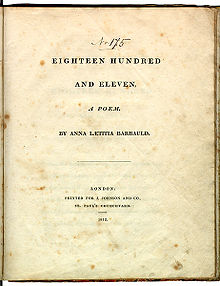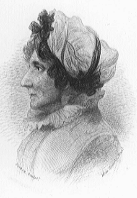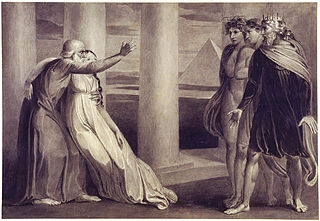
Eighteen Hundred and Eleven: A Poem (1812) is a poem by Anna Laetitia Barbauld criticising Britain's participation in the Napoleonic Wars.

Eighteen Hundred and Eleven: A Poem (1812) is a poem by Anna Laetitia Barbauld criticising Britain's participation in the Napoleonic Wars.
Britain had been at war with France for a decade and was on the brink of losing, when Barbauld presented her readers with her shocking Juvenalian satire. She argued that the influence of Great Britain was waning and the influence of the United States was waxing. It was to the United States that Britain's wealth and fame will now go, she contended, and Britain will become nothing but an empty ruin. She tied this decline directly to Britain's participation in the Napoleonic Wars:
And think'st thou, Britain, still to sit at ease,
An island Queen amidst thy subject seas,
While the vext billows, in their distant roar,
But soothe thy slumbers, and but kiss thy shore?
To sport in wars, while danger keeps aloof,
Thy grassy turf unbruised by hostile hoof?
So sing thy flatterers; but, Britain, know,
Thou who hast shared the guilt must share the woe.
Nor distant is the hour; low murmurs spread,
And whispered fears, creating what they dread;
Ruin, as with an earthquake shock, is here (lines 39–49)
This pessimistic view of the future was, not surprisingly, poorly received; "reviews, whether in liberal or conservative magazines, ranged from cautious to patronizingly negative to outrageously abusive." [1] Barbauld, stunned by the reaction, retreated from the public eye; in fact, she never published another work within her lifetime. Even when Britain was on the verge of winning the war, Barbauld could not be joyous. She wrote to a friend: "I do not know how to rejoice at this victory, splendid as it is, over Buonaparte [sic], when I consider the horrible waste of life, the mass of misery, which such gigantic combats must occasion." [2]
Everard Green noted that "In her own time, the idea that the United States – then still mainly reckoned a minor and peripheral power – would one day eclipse the mighty British Empire was greeted with scorn. Indeed, at the time when the poem was written, Britain was yet to reach its zenith as a world power. Yet what Barbauld predicted did come to pass, though very much later – not due to the Napoleonic Wars, but due to the Second World War." [3]

Raymond Queneau was a French novelist, poet, critic, editor and co-founder and president of Oulipo, notable for his wit and cynical humour.

Felicia Dorothea Hemans was an English poet. Two of her opening lines, "The boy stood on the burning deck" and "The stately homes of England", have acquired classic status.

Anna Laetitia Barbauld was a prominent English poet, essayist, literary critic, editor, and author of children's literature. A prominent member of the Blue Stockings Society and a "woman of letters" who published in multiple genres, Barbauld had a successful writing career that spanned more than half a century.
Lucy Aikin was an English historical writer, biographer and correspondent. She also published under pseudonyms such as Mary Godolphin. Her literary-minded family included her aunt Anna Laetitia Barbauld, a writer of poetry, essays and children's books.
Chidiock Tichborne, erroneously referred to as Charles, was an English conspirator and poet.

Tiriel is a narrative poem by William Blake, written c.1789. Considered the first of his prophetic books, it is also the first poem in which Blake used free septenaries, which he would go on to use in much of his later verse. Tiriel was unpublished during Blake's lifetime and remained so until 1874, when it appeared in William Michael Rossetti's Poetical Works of William Blake. Although Blake did not engrave the poem, he did make twelve sepia drawings to accompany the rough and unfinished manuscript, although three of them are considered lost as they have not been traced since 1863.
Nationality words link to articles with information on the nation's poetry or literature.
Nationality words link to articles with information on the nation's poetry or literature.

F. De Samara to A. G. A. is a poem by British author and poet Emily Jane Brontë, written on November 1, 1838.

Lessons for Children is a series of four age-adapted reading primers written by the prominent 18th-century British poet and essayist Anna Laetitia Barbauld. Published in 1778 and 1779, the books initiated a revolution in children's literature in the Anglo-American world. For the first time, the needs of the child reader were seriously considered: the typographically simple texts progress in difficulty as the child learns. In perhaps the first demonstration of experiential pedagogy in Anglo-American children's literature, Barbauld's books use a conversational style, which depicts a mother and her son discussing the natural world. Based on the educational theories of John Locke, Barbauld's books emphasise learning through the senses.

Hymns in Prose for Children (1781) is a children's book by Anna Laetitia Barbauld.
"Dura Navis" was composed by Samuel Taylor Coleridge in 1787. It is one of his earliest known poems and was written for a school assignment while Coleridge attended Christ's Hospital. The poem describes the pain of solitude that accompanies travel and the risks that accompany a voyage at sea, including combat against others and resorting to cannibalism.
Palgrave Academy was an early dissenting academy, that is, a school or college set up by English Dissenters. It was run from 1774 to 1785 in Palgrave, Suffolk - on the boarder of Norfolk - by the married couple Anna Laetitia Barbauld and her husband Rochemont Barbauld, a minister. The academy attracted parents who wished an alternative to traditional education for their sons.
Charles RochemontAikin (1775–1847) was an English doctor and chemist.
Mary Anne Jevons, néeRoscoe (1795–1845) was an English poet.
Anna Letitia Le Breton was an English author.
The Cambridge Intelligencer was an English weekly newspaper, appearing from 1793 to 1803, and edited by Benjamin Flower. The historian J. E. Cookson called it "the most vigorous and outspoken liberal periodical of its day".
Ann Batten Cristall (1769–1848) was an English poet and schoolteacher on friendly terms with Mary Wollstonecraft, Anna Letitia Barbauld and several other writers of her period. A recent critic has noted in her work "technical virtuosity, masked by claims of metrical irregularity, and a profound questioning of Romantic values."

"Poetical Essay on the Existing State of Things" is an essay by Percy Bysshe Shelley published in 1811. The work was lost since its first appearance until a copy was found in 2006 and made available by the Bodleian Library in 2015. The anti-war and anti-imperialist work was intended to raise money for the radical Irish journalist Peter Finnerty, who had been imprisoned for libeling the Anglo-Irish politician Robert Stewart, Viscount Castlereagh, whom he accused of mistreating United Irish prisoners. The work is a precursor to The Masque of Anarchy and "England in 1819".
Sarah Lawrence (1780–1859) was an English educator, writer and literary editor. She ran a girls' school in Gateacre near Liverpool, and was a family friend of the Aikins of Warrington, and an associate of members of the Roscoe circle.